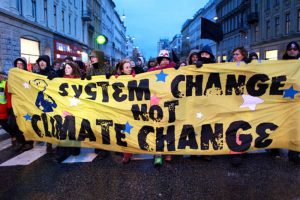 Those of us in the movement for climate justice have for many years advocated for systematic and radical changes to our economy and society to avert the threat of climate chaos. For decades, scientists have warned us about the implications of sea-level rise, droughts and super-storms to the point that we are now finding ourselves in earth’s sixth mass extinction event. While our movement against further fossil fuel extraction, the destruction of forests and the growing economic disparities within society has grown in recent years, we are still largely dealing with governments and corporations who remain part of the problem and are unwilling to shift.
Those of us in the movement for climate justice have for many years advocated for systematic and radical changes to our economy and society to avert the threat of climate chaos. For decades, scientists have warned us about the implications of sea-level rise, droughts and super-storms to the point that we are now finding ourselves in earth’s sixth mass extinction event. While our movement against further fossil fuel extraction, the destruction of forests and the growing economic disparities within society has grown in recent years, we are still largely dealing with governments and corporations who remain part of the problem and are unwilling to shift.
1. COVID19 – an outpouring of solidarity and mutual aid
The last few months has seen the spread of COVID19 to all corners of our planet. A virus with no cure is killing and infecting thousands. Communities, iwi, councils and governments are rising up to the challenge to contain the virus. We are witnessing an outpouring of love, solidarity and mutual aid in the community and governments are taking drastic measures to protect the vulnerable in our society. The climate movement has nothing but admiration for how we are responding collectively and decisively.
2. Not going back to ‘normality’
Governments across the globe have pledged economic stimulus packages to support workers and companies who are facing the brunt of virus. In Aotearoa, this includes the tourism industry, which has more or less collapsed with entry restrictions; the hospitality sector; musicians and artists; and will also have long-term serious implications on the agricultural industry.
Government intervention is a must in these difficult times. But let’s be clear – the last thing we want is to return to ‘normality’.
Let’s just dissect ‘normality’ for a few sentences. Is it normal that the current rate of extinction of species is estimated at 100 to 1,000 times higher than natural background rates? Is it normal that the past hundred years have seen global temperatures rise by over 1 degrees due to human activity? Is it normal that the world’s 26 richest people own as much wealth as poorest 50% together? No. no and no.
There is no going back to normality because normality is destroying our planet and our lives. So the last thing we should be doing right now is to collectivise the losses of companies that have been destroying this planet for decades.
3. Survive the pandemic – but extinct by the end of the millennia?
Surviving this pandemic is a priority. It has to be. It is a matter of survival, particularly for poor, indigenous and marginalised communities. But let’s intervene in the economy so that we not only get through the pandemic, but so that we also get through this millennia.
4. Capitalism is not our future
Capitalism is a relatively new economic model. For thousands of years, humans have lived in relative harmony with each other and the environment in tribal communities. Yes, there were rough times. Yes, there was war. But the presence of war, environmental degradation, disease and inequality with our current model is unprecedented. Capitalism is the root cause of the climate crisis. The never-ending concentration of economic and political power in the hands of a few at the expense of everyone else is bringing misery and hardship on a massive scale. We have to move on. We have to admit that capitalism was a bad mistake, learn from our mistakes and find collective solutions.
5. Solutions are beautiful – and they are everywhere
While the current pandemic has shown us the fragility of our own existence, it has also demonstrated that human nature is ultimately caring, kind and follows the maxim of ‘one for all, and all for one’. Values like solidarity and mutual aid – values that are so antithetical to the capitalist paradigm – run so strongly in our communities.
While many of us are involved on a day-to-day basis defending and expanding communal spaces and ideas as solutions to the climate crisis, we must be vocal now that we collectively seize this moment to move away and leave behind the age of capitalism, the age of plastic, the age of human domination over nature.

